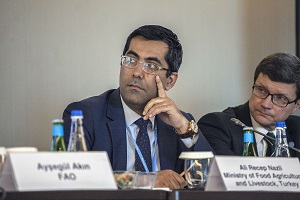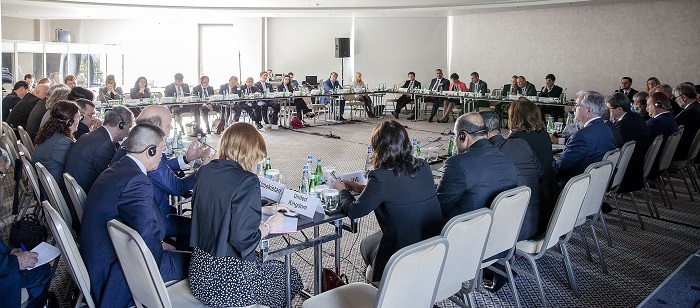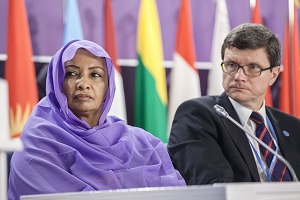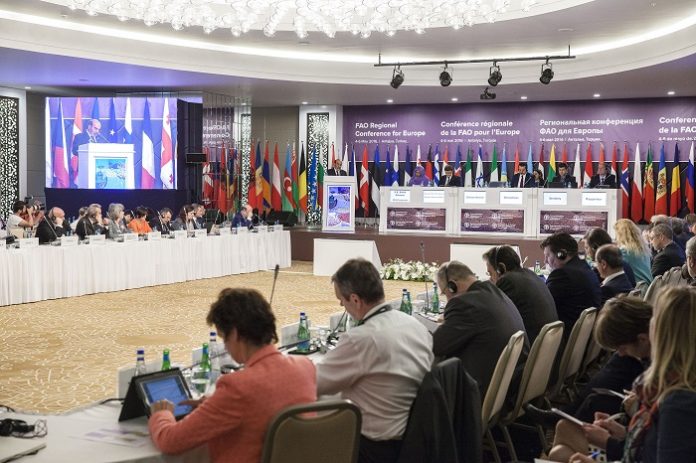Ensuring adequate, nutritious and safe food for a growing population is a complex task – one where food, livelihoods and management of natural resources can no longer be handled separately. Bearing in mind specific regional challenges, the countries of Europe and Central Asia appear determined to get it right.
Gathered here for the 30th FAO Regional Conference for Europe, delegates of member countries and from observer organizations this morning discussed the multiple benefits of pulses, a theme that complements the nutrition and environmental concerns of the region. Pulses are leguminous crops harvested for use as dried beans, peas, lentils and similar foods. Pulses are being promoted this year through the International Year of Pulses, led by FAO.

The highest consumers of pulses in the region are Turkey, Serbia, Spain, Israel, and The former Yugoslav Republic of Macedonia, while very low production and consumption rates are seen in the Central Asian countries. In the region’s developing economies, pulses are cultivated in marginal zones and not widely used for commercial purposes.
Yesterday Ministers of Agriculture and other high-level participants wrestled with the question of how to give life to the globally agreed Sustainable Development Goals in this part of the world.
The 17 goals, also known collectively as the 2030 Agenda for Sustainable Development, were adopted unanimously by 193 countries in September 2015. Fulfilment of the goals would mean a transformed world – more equitable, sustainable and resilient – by the year 2030. Countries now are expected to align their national priorities with the Agenda, based on their needs and capacities.
Several of the goals directly concern food and agriculture, while others can be realized only with contributions from the food and agricultural sector. Countries called for new combinations of policies, partnerships and investments as creative solutions to complex development problems.
The region – stretching from the Atlantic coast of Western Europe to Russia’s Pacific shores – is highly heterogeneous. The prevalence of poverty is low in most of the European countries, but remains an issue for Eastern Europe and Central Asia, particularly in rural areas.
 Large corporate farms co-exist with family farms. Smallholders need special attention, the Conference agreed, especially in Central Asia where almost 90 percent of agricultural output is produced by family farms. Access to services, knowledge, markets, agricultural inputs and financial resources are crucial if family farmers are to increase their productivity and incomes.
Large corporate farms co-exist with family farms. Smallholders need special attention, the Conference agreed, especially in Central Asia where almost 90 percent of agricultural output is produced by family farms. Access to services, knowledge, markets, agricultural inputs and financial resources are crucial if family farmers are to increase their productivity and incomes.
Outright hunger is relatively low in the region, but different forms of malnutrition are an increasing concern in all 53 countries. Micronutrient deficiencies, overweight and obesity are some of the most common forms of malnutrition in the region.

In a paper presented during the session, FAO suggests that attention be focused on increasing employment and incomes in rural areas, particularly in the Caucasus, Central Asia, the Balkans and Eastern Europe where agriculture is a major source of employment. Development of the agriculture sector can contribute to ensuring employment, equal wages and decent living conditions for agricultural workers in those countries.
Social protection too, emerges as a useful mechanism for generating rural employment in the region while enabling growth in agriculture.
During the debate, emphasis was on integrating three principles into how food is produced, processed, distributed and consumed: 1) resilience to changes in food demand patterns and adverse effects of climate change, 2) fundamental rights and decent livelihoods for people working in the food system, and 3) management of natural resources in ways that have minimal environmental impact.
Limited research, lack of technology and agricultural policies that tend to favour cereals are among the reasons that pulses are not more widely grown or consumed in the region.
The Regional Conference will continue tomorrow with sessions that will lay down priorities for FAO in the region over the next two years.


